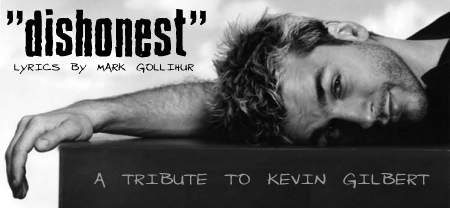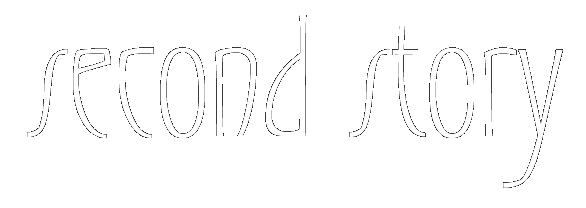Mark here.

I was going through some old stuff, and I found my original notes for the meanings of the many references and allusions in Dishonest, which I wrote the lyrics for; it’s dedicated to (and is essentially about) the memory of songwriter and performer Kevin Gilbert, for whom I have a very strong fandom and deep respect, particularly for his lyrical skills.
The lyrics for Dishonest were written so long ago, I had forgotten some of the finer points and deeper references, so it was a bit of an epiphany to find this document. So I figured I would share.
Below are the lyrics, broken into sections, with a little text explaining the meaning, the allusions to Kevin’s own lyrics/songs/life (some subtle, some not-so-much.) Having not known him personally, there is no doubt a good bit of presumption here – but being a major fanboy of his for over two decades, I’ve read so much and listened so intently, it didn’t feel so at the time I wrote it.
I hope you find it interesting.
Dishonest
You could've just suffered for your art or
Been a troubled troubadour

Most artists claim to “suffer for their art,” making sacrifices and living the life of a pauper to maintain the credibility and reality of their music or art. A Troubadour is a singer/performer, so a troubled troubadour is your typical rock musician with loads of problems (i.e. drugs, legal troubles, etc.) It’s also a sly reference to a club in LA that was one of Kevin’s regular haunts – it was called, obviously, the “Troubadour.”
Instead you had to be a martyr
The tragic king who came before
A martyr is someone who dies for his cause; Kevin’s “cause” being his own music and life, he martyred himself – but for what? “Tragic King” is an allegory to Shakespeare, which has a nice twist in “Shaming of the True” as you’ll see in a bit. The tragic king in Shakespeare can be Macbeth or Hamlet, who both fell victims to their own failures or – particularly in the case of Macbeth – his own ambition. But to be a tragic king is rather pretentious, so this is said a bit tongue in cheek.
Fell victim not to compromise Nor being someone's Spartacus…
Despite the reference, unlike Macbeth, Kevin’s undoing was not due to compromising his ideals… or being a slave to someone else, as some may attest. (Spartacus was a king who was revolted against and made a slave against his will.) The allegory here is that Kevin was not truly a victim of someone (Sheryl Crow? The record industry?) changing the course of his life against his will.
A chipped heart led to your demise
The patsy for your own distrust
One could believe that it may have been because his heart was shattered, broken by failed relationships (romantic and musical) and his inability to truly “break through” into the music mainstream… But then, when you get right down to it, the “chipped heart” thing is just bullshit – it’s a cover (patsy) for what the real problem was. It wasn’t the breaking of his heart that led to his downfall – it was how he handled it. The fault was all his – his shortcomings and failures were due to his own guarded heart and (pretty well-documented) pessimism. And yet, he (and so many of his devoted fans) often blame Sheryl, the industry, and anyone else – but Kevin himself.
I eavesdrop and I empathize
Kevin’s songs are mostly autobiographical – by listening to his music, I am essentially eavesdropping on his life. And since I can relate so totally to so many of his songs (particularly “Tea for One,” the song by which I discovered his music,) I empathize with the stories as well.
I listen to your dreams collide
Again, since many of his songs are taken from his own life, many of them detail his unhappiness, his failed dreams, and his losses in love and life. In songs like this, I hear “his dreams colliding” into a musical montage of depression, even though he’d often mask them in humor (see: “The Ballad of Jenny Ledge” by Toy Matinee, or most anything on the Kaviar album).
But I never really knew you like did a blessed few
Despite all this second-hand insight into his life and music (and feeling inspired enough by his musical legacy to write a tribute) I never actually met the man, or even had a chance to see him perform.
If there were one thing I would take It'd be disdain for all things fake I won't be dishonest
One of the things in Kevin’s legacy that means the most to me is his unwavering dedication to not selling out. In a radio interview concerning “Thud,” he once said that his intent with his new album was to scale back and “come up with something a little more… honest.” In fact, we even got permission from Kevin’s estate to use a clip of him saying it to open the song. What he meant by that is that he wanted to write and record things totally from the heart, not from some desire to break into the business with music that wasn’t truly sincere.
This is the gist, or thesis, of the entire song; it’s the most valuable and important thing for me to take from his legacy. His loss loses some of its sting if I – and hopefully others – can see that the most important part of “popular music” isn’t “popular.”
It’s “music.”
...No shame here for the true
“Shame here for the True” is a reference to Kevin’s crowning achievement – a rock opera about the seedy underworld of the music industry – that wasn’t completed or released until after his death. Its title is itself a malapropism on the title of Shakespeare’s “Taming of the Shrew,” which is the Shakespeare reference I mentioned earlier.
Since the “moral of the story” in his rock opera has the protagonist reminiscently sermonizing about being true to oneself (“Believe in what you’re doing / Remember who you are“), this is the key to honoring his musical legacy.
I listen with a biased ear
To tales I know through words alone
Now we hit upon the Sheryl issue again; I’m basically saying that because I’m a fan of his music, I generally tend to take “his side” whenever issues arise concerning Sheryl and the way she “took advantage” of Kevin and other members of the Tuesday Music Club. But I know these tales “through words alone” because, as we know, I wasn’t actually there…
Perhaps the legacy I hold dear
Would be better served by stick and stone
…and maybe my opinions of Kevin’s own role in his undoing – and Sheryl’s as well – would be different if I was. The “Stick and stone” completes the allegory to the “Sticks and stones may break my bones, but words will never hurt me” chant of our childhood – maybe the way I view things would be different if rather than just hearing the words (which can’t hurt) I had actually seen the events unfold (the metaphorical basis for sticks and stones.)
So I'll wheel in the teacart
We'll sit and sip and reminisce
A pointed and obvious allusion to “Tea for One,” from Thud, the very song which drew me to Kevin in the first place. In this song, he laments that he’s missed the opportunity for companionship and is thereby drinking “tea for one” rather than “tea for two.” A rather funny word to use, “reminisce”… it implies that we’ll talk about a past history that we share, which is impossible since we never met. However, since I relate so totally to many of his pieces – which are largely autobiographical – I use the word specifically to note the kinship that I feel with him as a songwriter. Since I share some of the same musical inspirations, dreams and ideals, we can thereby “reminisce” about our shared, yet separate, musical lives.
I'll speak not of your tragic art
We'll just catch up on chapters missed
There’s been enough said of Kevin’s musical legacy. When I sit down to talk to Kevin, I’m don’t plan to ask him about his music; I know enough about that. What I want to do – to complete my “Kevin knowledge” – is to find out more about Kevin, the person. Though “tragic art” could also backhandedly reference the unglamorous way by which he died.
The “chapters missed” is another pointed reference to one of his own songs, “Song for a Dead Friend.” In that song, he laments the loss of a good friend whom he respected most highly because of his brilliance and honor: “Cause you read every chapter / And I just glossed right over them and pretended I knew.” This is a key line – it not only references the fact that we’ll catch up on the chapters of his life that I missed, but carries the double meaning that – by sharing his story, and coming to terms with it – he can catch up on the chapters of his own life that he missed, and maybe set his soul at ease.
Not only that, but the thing he reveres most about his “dead friend” is his honor (and honesty.) This brings the song full circle, since the whole point is to take away the good in his life – the need to be “honest.” And that is the best legacy I can give him – to maintain that ideal in my own music. Not to celebrate his life, per se, but his ideals.
I freely admit that the lyrics to this song are rather presumptuous on my part, but I came by the feelings honestly, and hope that it comes across. I have nothing but reverent respect for the immense talent that is apparent in all of Kevin’s music, as well as the wonderful efforts that the people who cared about him have made since his passing, to get as much of his music into the light as possible.
When creating the package for the new album, I considered re-naming the song “(I Won’t Be) Dishonest” because, after all this time, it occurred to me that a tribute called “Dishonest” might seem too negative. But we decided to keep it as we always called it.
